
Dutch postcard, no. 1061.
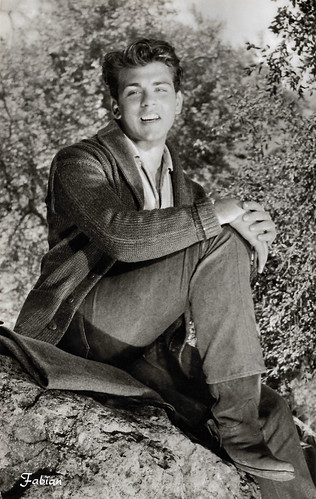
Dutch postcard by Uitgeverij Int. Filmpers, Amsterdam (I.F.P.), no. WPS 33 / 261. Photo: Chancellor. Caption: Read "Song Parade". More than 20 song texts every month.
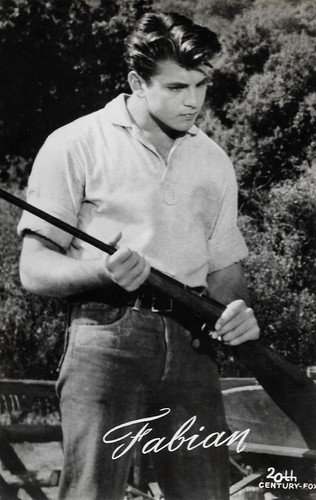
Dutch postcard by Uitg. Takken, Utrecht, no. AX 4600. Photo: 20th Century Fox. Fabian in Hound-Dog Man (Don Siegel, 1959).
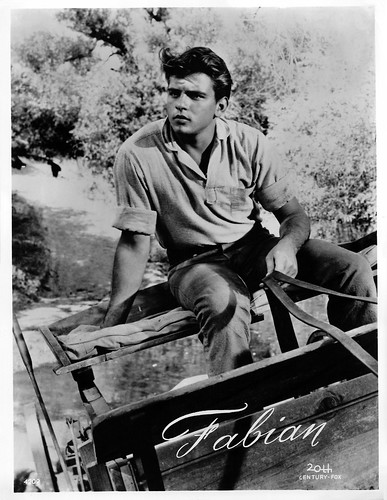
Big Dutch card. Photo: 20th Century Fox. Fabian in North to Alaska (Henry Hathaway, 1959).
The little girls at the hop went wild
Fabiano Anthony Forte, stage name Fabian, was born in Philadelphia, Pennsylvania, in 1943. He was the son of Josephine and Dominic Forte; his father was a Philadelphia police officer. Fabian was discovered in 1957 by Bob Marcucci and Peter DeAngelis, the owners of Chancellor Records. At the time, record producers were looking to the South Philadelphia neighbourhoods in search of teenage talents with good looks. Frankie Avalon, also from South Philadelphia, tipped them off about Fabian.
At 15, he won second prize as "The Promising Male Vocalist of 1958". His first local hit was 'Lilli Lou' in 1958. This helped Fabian meet Dick Clark, who agreed to try Fabian at one of Clark's record hops, where singers would perform to teenage audiences. Fabian lip-synched to a song and Clark wrote "The little girls at the hop went wild. They started screaming and yelling for this guy who didn't do a thing but stand there. I've never seen anything like it."
Clark told Marcucci: "You got a hit, he's a star. Now all you have to do is teach him to sing." Clark eventually put the young singer on American Bandstand where he sang 'I'm in Love'. From then he had a series of successes in a short time with songs by composers Doc Pomus and Mort Shuman, such as 'I'm a Man' (1958), 'Hound Dog Man' (1959), 'Turn Me Loose' (1959) and his biggest hit 'Tiger' (1959), which reached number 3 on the Billboard charts.
A few years later, he already had a dozen hits, eight albums, and three gold records to his name. His singing career more or less came to an end at the age of eighteen when he bought out his contract with Marcucci. It happened in the wake of the Payola scandal between 1959 and 1962. Forte testified before Congress that his recordings had been doctored electronically to "significantly improve his voice.
Nik Cohn later wrote that the record people had produced "a computer product" with Fabian: "He brought the basic requirements with him - an olive complexion, duck-tail hairdo and assembly-line face [...] They had him dressed up, had him learn how to talk real nice, had his voice trained. They made him really round and flawless like a billiard ball. There was only one catch: he couldn't sing ..."
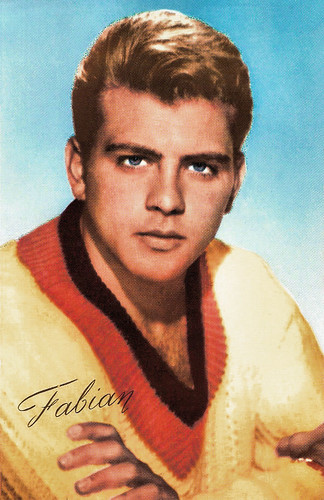
Vintage postcard.
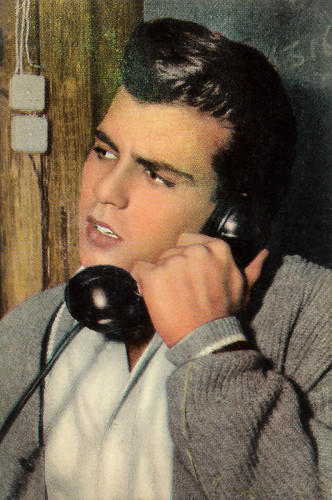
Belgian collectors card in The Twist Series, no. 2.

French postcard by E.D.U.G., no. 154.
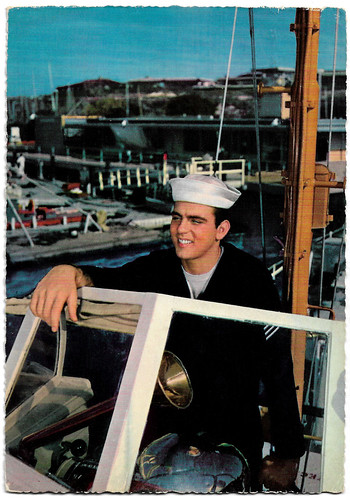
West-German postcard by Krüger. Photo: Terb Agency.
Posing nude for Playgirl
Fabian signed a deal with 20th Century Fox. The studio had enjoyed success casting teen idol pop stars in films, such as Elvis Presley and Pat Boone. They decided to do the same thing with Fabian. He played his first role in the film drama Hound-Dog Man (Don Siegel, 1959), with Stuart Whitman and Carol Lynley. The film was not a success, but the title song, sung by Fabian, became a hit in 1959. The studio, however, tried again in two smaller roles, supporting a bigger star – the comedy High Time (Blake Edwards, 1959), with Bing Crosby, and the Western North to Alaska (Henry Hathaway, 1959), with John Wayne. Both films were popular, especially the latter, and in November 1960 his contract with the studio was amended with a salary increase – it was now a seven-year deal with an option for two films a year.
Controversial was his role as a psychopathic killer in the episode A Lion Walks Among Us (Robert Altman, 1961) of the TV programme Bus Stop. The episode was extremely violent, leading other parties to refuse to broadcast it, and the programme was even discussed in the US Senate. However, the series was good for Fabian's acting career and saw him regarded with more respect. He later said this was his best performance. Fabian appeared in Five Weeks in a Balloon (Irwin Allen, 1962) with Red Buttons and Barbara Eden. The film was loosely based on the 1863 novel of the same name by Jules Verne. He also played a suitor to James Stewart's daughter in the hit comedy Mr. Hobbs Takes a Holiday (Henry Koster, 1962) and a soldier in the star-studded war film The Longest Day (Andrew Marton, a.o., 1962).
Fabian had not become a film star but was in demand as an actor, appearing in episodes of series like The Virginian, Wagon Train, The Greatest Show on Earth, and The Eleventh Hour. In November 1965, he was contracted by American International Pictures. His first film for the company was alongside Beach Party stars Frankie Avalon and Annette Funicello in the stock car racing film Fireball 500 (William Asher, 1966). AIP then sent him to Italy to play a role originally intended for Avalon in Dr. Goldfoot and the Girl Bombs (Mario Bava, 1966), supporting Vincent Price.
Back in the United States, he made another stock car racing film for AIP, Thunder Alley (Richard Rush, 1967), opposite Funicello. His fourth movie for AIP was Maryjane (Maury Dexter, 1968), where Fabian played a school teacher fighting the evils of the marijuana trade. He returned to racing car dramas with The Wild Racers (Daniel Haller, 1968), partly financed by Roger Corman and shot in Europe. This was not a big hit on release but has developed a cult following. In his seventh and last film for AIP, A Bullet for Pretty Boy (Larry Buchanan, 1970), he played gangster Charles Arthur Floyd opposite Jocelyn (Jackie) Lane.
To raise his profile, he posed nude for Playgirl magazine. In 1973, he picked up singing again, only to quit temporarily in 1977 and return in 1981. He performed in the context of numerous revival shows, for example as a trio with Frankie Avalon and Bobby Rydell. However, he would not reach the popularity of his teenage years. Fabian has been married three times. His first marriage was to model Kathleen Regan in 1966. They had two children together, Christian and Julie, but they divorced in 1979. He married Kate Netter in 1980; they divorced in 1990. In 1998 he married American beauty queen Andrea Patrick. In 2002, Fabian received a star on the Hollywood Walk of Fame.

Italian postcard by Rotalfoto, no. 923. Sent by mail in 1963.
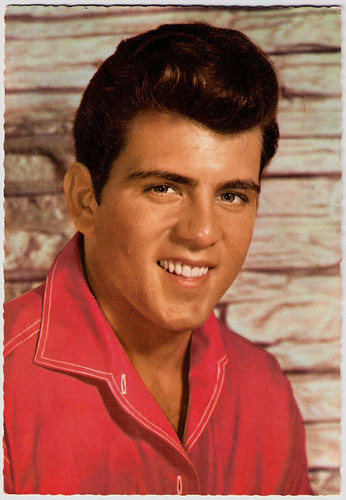
West-German postcard by ISV, no. A 98. Photo: 20th Century Fox.
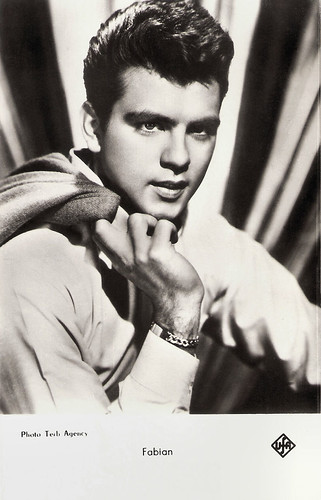
French postcard by Editions P.I., Paris, offered by Les Carbones Korès "Carboplane", no. FK 98 A. Editions P.I. was the French license holder for Universum Film AG (Ufa). Photo: Terb Agency / Ufa.

Dutch postcard. Photo: Ufa.
Sources: Wikipedia (Dutch and German) and IMDb.
This post was last updated on 7 April 2024.
No comments:
Post a Comment